PEP小学英语五年级下册期末总复习知识重点
PEP小学英语五年级下册第一单元知识学习总结要点归纳
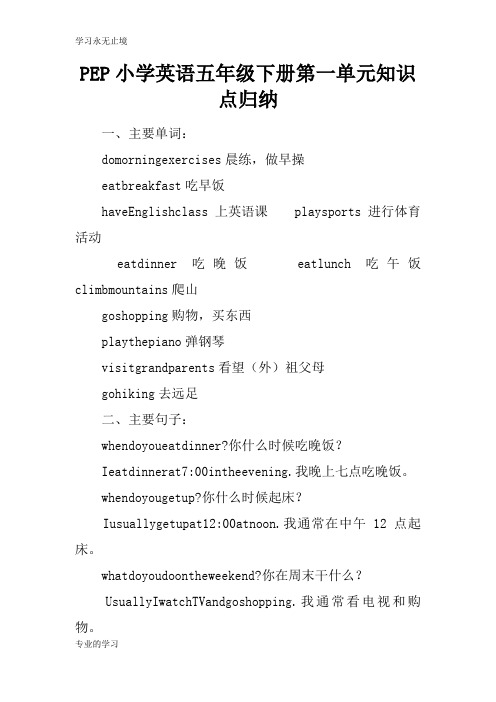
PEP小学英语五年级下册第一单元知识点归纳一、主要单词:domorningexercises晨练,做早操eatbreakfast吃早饭haveEnglishclass上英语课playsports进行体育活动eatdinner吃晚饭eatlunch吃午饭climbmountains爬山goshopping购物,买东西playthepiano弹钢琴visitgrandparents看望(外)祖父母gohiking去远足二、主要句子:whendoyoueatdinner?你什么时候吃晚饭?Ieatdinnerat7:00intheevening.我晚上七点吃晚饭。
whendoyougetup?你什么时候起床?Iusuallygetupat12:00atnoon.我通常在中午12点起床。
whatdoyoudoontheweekend?你在周末干什么?UsuallyIwatchTVandgoshopping.我通常看电视和购物。
SometimesIvisitmygrandparents.有时候我去看望我的外祖父母。
Ioftenplayfootball.我经常踢足球。
SometimesIgohiking.有时候我去远足。
三、同义词:eatbreakfast—havebreakfasteatlunch—haveluncheatdinner—havedinnerplaysports—dosports复数形式:policeman—policemenpolicewoman—policewomen现在分词:tell—telling三单:say—says同义句:whatdoyoudo?或whatareyou?对应的第三人称单数形式:whatdoeshe/shedo?或whatishe/she?(他/她是做什么工作的?)四、表示频度的副词:always总是,一直usually通常,常常often经常sometimes有时候never从不频率由高到低排列:always〉usually〉sometimes〉never.五、以复数形式出现的词组:visitgrandparents,planttrees六、介词后跟表示时间的词语时,表示在某年、某月、某个季节,某个时候(在上午,在下午,在晚上)用in;表示在某一天,在星期几用on,在具体的几点几分用at.例如:用介词in:inXX(在XX年),inmay(在五月),insummer(在夏季),inthemorning(在早上),intheafternoon(在下午),intheevening(在晚上)用介词on:onmonday(在周一),onchildren’sDay(在儿童节这一天)用介词at:atnoon(在中午),atnight(在子夜),at10:00(在十点钟)七、too和either的用法区别:too和either都是“也”的意思,但too用于肯定句,either用于否定句。
【人教版】小学PEP英语五年级下册第五单元知识点归纳
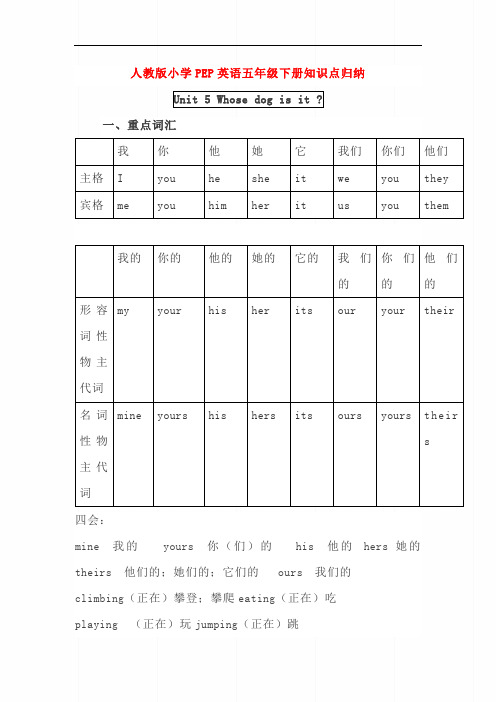
人教版小学PEP英语五年级下册知识点归纳Unit 5 Whose dog is it ?一、重点词汇我你他她它我们你们他们主格I you he she it we you they 宾格me you him her it us you them我的你的他的她的它的我们的你们的他们的形容词性物主代词my your his her its our your their名词性物主代词mine yours his hers its ours yours theirs四会:mine 我的yours 你(们)的his 他的hers她的theirs 他们的;她们的;它们的 ours 我们的climbing(正在)攀登;攀爬eating(正在)吃playing (正在)玩jumping(正在)跳drinking(正在)喝(水) sleeping (正在)睡觉三会:each 每一;各个other 其他each other 相互excited 兴奋的;激动的like 像……那样二、掌握的短语climb trees 爬树play football 踢足球look at 看 a beautiful painting 一幅美丽的画in the kitchen在厨房play with each other一起玩耍drink water 喝水listen to music 听音乐read books读书三、名词性物主代词和形容词性物主代词表示所有关系的代词叫做物主代词,即表示事物主人的代词。
它包括名词性物主代词和形容词性物主代词。
注意:1、形容词性物主代词相当于一个形容词,不能单独使用,后面需要跟名词,常用来修饰、限定后面的名词。
如:This is my book.(这是我的书。
).That is his bag.(那是他的书包。
)2、名词性物主代词需独立使用,后面不能跟名词,它相当于“形容词性物主代词+名词”。
如:It’s mine. (它是我的。
PEP小学英语五年级下册各单元知识重点总结
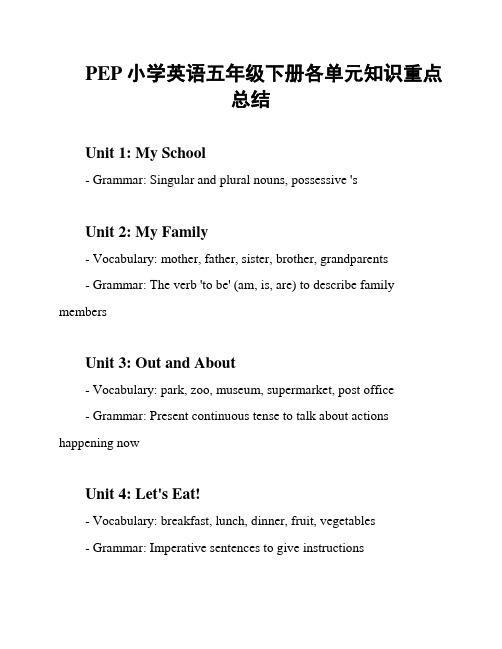
PEP小学英语五年级下册各单元知识重点总结Unit 1: My School- Grammar: Singular and plural nouns, possessive 'sUnit 2: My Family- Vocabulary: mother, father, sister, brother, grandparents- Grammar: The verb 'to be' (am, is, are) to describe family membersUnit 3: Out and About- Vocabulary: park, zoo, museum, supermarket, post office- Grammar: Present continuous tense to talk about actions happening nowUnit 4: Let's Eat!- Vocabulary: breakfast, lunch, dinner, fruit, vegetables- Grammar: Imperative sentences to give instructionsUnit 5: At the Farm- Vocabulary: farmer, barn, cow, pig, chicken- Grammar: There is/There are to talk about existenceUnit 6: Our Town- Vocabulary: street, hospital, police station, fire station, city- Grammar: Prepositions of place (in, on, under, behind, next to)Unit 7: Weather Report- Vocabulary: sunny, cloudy, rainy, snowy, windy- Grammar: Adjectives to describe weatherUnit 8: Fun with Friends- Vocabulary: play, sing, dance, swim, draw- Grammar: Simple present tense to talk about daily activitiesUnit 9: In the Ocean- Vocabulary: fish, dolphin, shark, octopus, seahorse- Grammar: Wh- questions using 'What' and 'Where'Unit 10: Happy Holidays- Vocabulary: Christmas, Easter, Halloween, New Year's Day, Thanksgiving- Grammar: Use of can for ability。
PEP小学五年级下册英语知识点总结全
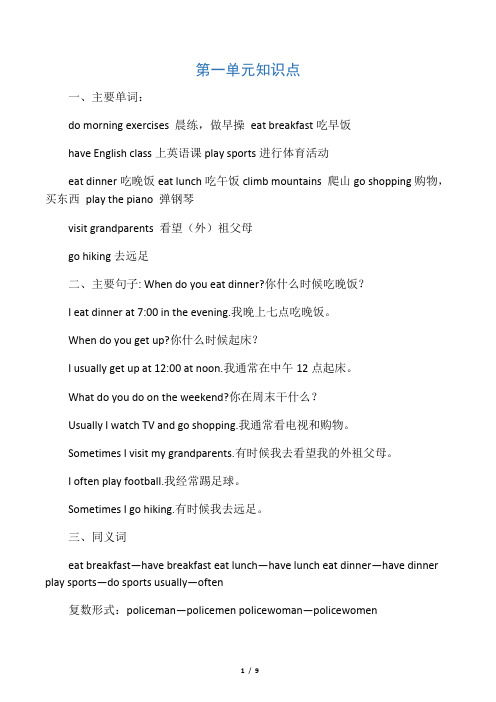
第一单元知识点一、主要单词:do morning exercises 晨练,做早操eat breakfast吃早饭have English class上英语课play sports进行体育活动eat dinner吃晚饭eat lunch吃午饭climb mountains 爬山go shopping购物,买东西play the piano 弹钢琴visit grandparents 看望(外)祖父母go hiking去远足二、主要句子: When do you eat dinner?你什么时候吃晚饭?I eat dinner at 7:00 in the evening.我晚上七点吃晚饭。
When do you get up?你什么时候起床?I usually get up at 12:00 at noon.我通常在中午12点起床。
What do you do on the weekend?你在周末干什么?Usually I watch TV and go shopping.我通常看电视和购物。
Sometimes I visit my grandparents.有时候我去看望我的外祖父母。
I often play football.我经常踢足球。
Sometimes I go hiking.有时候我去远足。
三、同义词eat breakfast—have breakfast eat lunch—have lunch eat dinner—have dinner play sports—do sports usually—often复数形式:policeman—policemen policewoman—policewomen四、表示频度的副词:always 总是,一直usually 通常,常常often 经常sometimes 有时候五、以复数形式出现的词组:visit grandparents plant trees六、介词后跟表示时间的词语时,表示在某年、某月、某个季节,某个时候(在上午,在下午,在晚上)用in;表示在某一天,在星期几用on,在具体的几点几分用at.七、too 和either的用法区别:too和either都是“也”的意思,但too用于肯定句,either用于否定句。
PEP小学英语五年级下册期末总复习知识重点及练习

PEP五年级下册期末总复习Unit 1 This Is My Daydo morning exercises晨练eat breakfast吃早饭have english class上英语课play sports进行体育运动eat dinner吃晚饭when什么时候get up起床climb mountains爬山go shopping购物;买东西play the piano弹钢琴visit grandparents看望祖父母go hiking去远足on the weekend 在周末in the morning 在早上in the afternoon 在下午in the evening 在晚上at noon (noon ) 在中午often经常usually 通常;一般sometimes有时候at在……点钟话题:日常生活时态:一般现在时1.When do you do morning exercises? 你什么时候做早操?I usually do morning exercises at 8:00. 我经常八点钟做早操。
I usually get up at 12:00 at noon . 我经常在中午十二点起床。
) 2.When do you eat dinner ? 你什么时候吃晚餐?I eat dinner at 7:00 in the evening. 我在晚上七点种吃晚餐。
3.When is the best time to go to Beijing? Fall. 最好在什么时候去北京?秋天。
语法考点:1.When(什么时候)引导的特殊疑问句,就作息时间进行问答:--- When do you + 行为活动?--- I + 行为活动+ 具体时间。
例:A: When do you eat dinner? B: I eat dinner at 7: 00. .2.What(什么)引导的特殊疑问句,就活动内容进行问答:--- What do you do + 时间?(教材主要是周末)--- I + sometimes / often / usually + 行为活动+ 时间。
小学英语人教版PEP五年级下册1-6单元知识点总结

Unit1 My day一、基本句型1.询问什么时候做某事:- When do you ……?你什么时候……?- I usually…at …. 我通常在…(点钟)…。
例:-When do you eat breakfast?-I eat breakfast at 7:00.2.What do you do on the weekend?你周末做什么?- I +频率副词+周末活动+时间。
或Sometimes I+周末活动例句:I sometimes go shopping with my mum on the weekend.(周末我时候和妈妈一起去购物)二、知识点:1.频率副词:always(总是,一直)>usually(通常)>often(经常)>sometimes(有时)2.只有Sometimes可以放在句首。
(Sometimes I cook dinner.)3.On the weekend 在周末on Saturdays 在周六on Sundays在周日(别忘加s)Unit2 My favourite season1.-Which season do you like best? (你最喜欢哪个季节?)Why?(为什么)-I like +季节+ best.(I like spring∕summer∕fall∕winter best) Because ___________.(因为)或:-What‘s your favourite season? -My favourite season is spring∕summer∕fall∕winter.2.-Why do you like winter best?(你为什么最喜欢冬天?) -Because______.二、知识点:1.leaf(树叶):复数leaves2.W,W真神奇,问出许多大问题。
what,what,问“什么”,when,when,问“时间”,where,where,问“哪里”,which,which,“哪一个”,why,why,“为什么”.Unit3 My school calendar补充:1.Dragon Boat Festival 龙舟节或端午节(农历五月五日)一般在阳历6月2.月份首字母大写。
人教版小学PEP英语五年级下册知识点归纳
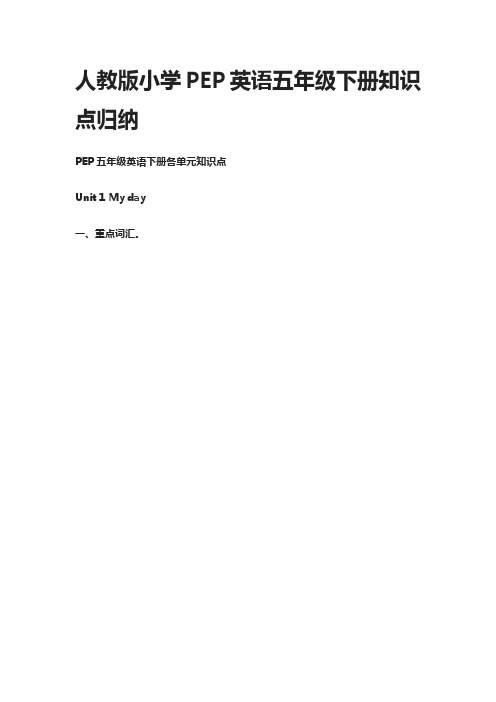
人教版小学PEP英语五年级下册知识点归纳PEP五年级英语下册各单元知识点Unit 1 My day一、重点词汇。
五、重点句型。
1、询问别人什么时候做某事的句型及回答。
句型结构:问:When do you+动词短语原形+其他?(你/你们什么时候做某事?)答:I/We(+频度副词)+动词短语原形+at+具体时间(我/我们通常在几点做某事。
)例:问:When do you go to bed?(你什么时候上床睡觉?)答:I go to bed at 9:00p.m (我晚上9点上床睡觉。
)注意:当主语是第三人称单数(he,she,it,单个人名或单数名词)时,助动词do 要变成does,句型结构是:When does+主语(第三人称单数)+动词短语原形+其他?2、询问别人周末做什么的句型及回答。
句型结构:问:What do you do on theweekend?(你周末做什么?)答:I(+频度副词)+动词(短语)+其他。
例:问:What do you do on theweekend?(你周末做什么?)答:I usually read books. (我通常看书。
)注意:当主语是第三人称单数(he,she,it,单个人名或单数名词)时,助动词do 要变成does,句型结构是:What does+主语(第三人称单数)+do+on the weekend?六、四会句子:When do you finish class in the morning ? 你们上午的课到几点结束?We finish class at 1 o’clock . 我们一点钟结束上午的课。
What do you do on the weekend ? 你周末做什么?I often watch TV and play ping-pong with my father . 我经常看电视,也常和我爸爸一起打乒乓球。
七、语音:cl /kl/ clean clock class cleverpl /pl / plate eggplant please play Unit 2 My favourite season三、重点句型1、询问别人天气怎么样的句型及回答。
2022-2023学年小学英语五年级下册期末查漏补缺专项复习之语法篇 (人教PEP版)
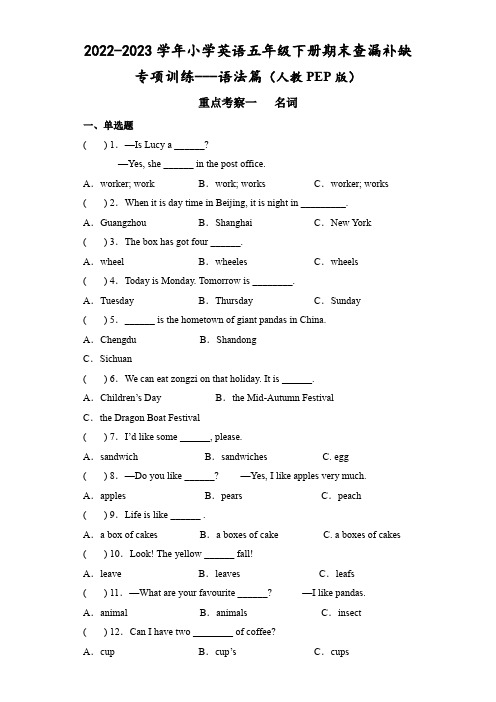
2022-2023学年小学英语五年级下册期末查漏补缺专项训练---语法篇(人教PEP版)重点考察一名词一、单选题() 1.—Is Lucy a ______?—Yes, she ______ in the post office.A.worker; work B.work; works C.worker; works () 2.When it is day time in Beijing, it is night in _________. A.Guangzhou B.Shanghai C.New York() 3.The box has got four ______.A.wheel B.wheeles C.wheels() 4.Today is Monday. Tomorrow is ________.A.Tuesday B.Thursday C.Sunday() 5.______ is the hometown of giant pandas in China.A.Chengdu B.ShandongC.Sichuan() 6.We can eat zongzi on that holiday. It is ______.A.Children’s Day B.the Mid-Autumn FestivalC.the Dragon Boat Festival() 7.I’d like some ______, please.A.sandwich B.sandwiches C. egg() 8.—Do you like ______? —Yes, I like apples very much. A.apples B.pears C.peach() 9.Life is like ______ .A.a box of cakes B.a boxes of cake C. a boxes of cakes () 10.Look! The yellow ______ fall!A.leave B.leaves C.leafs() 11.—What are your favourite ______? —I like pandas. A.animal B.animals C.insect() 12.Can I have two ________ of coffee?() 13.I started to speak when I was ten _____ old.A.month B.month’s C.months() 14.She has small ______ and long hair.A.nose B.eyes C.eye() 15.My favourite food is ______.A.tomato B.tomatos C.tomatoes() 16.I am hungry. I’d like some ______.A.juice B.breads C.bread() 17.—How much is the guitar?—It is five ________ and twenty-five _________. A.hundred; yuan B.hundred; yuans C.hundreds; yuan () 18.—What do you want to be? —I want to be a ______. A.postmen B.coach C.pilots() 19.There are many _______ in the park.A.girl B.boy C.kids() 20.—What colour are these ______? —They’re green. A.box B.boxes C.a box二、用单词正确形式填空21.I’d like some meat with _________ (potato) for lunch.22.Lily likes eating sweets, so she has many bad ___________ (tooth). 23.How many ___________ (city) are there in China?24.We have got many __________ (library) in Dezhou.25.There are different ___________ (way) to find information on this topic. 26.We have a few fun _________ (thing) in summer.27.The __________ (colour) are pretty in autumn.28.I can see many ___________ (cow) on the farm.29.This is ____________ (Danny) house.30.We have many ____________ (fruit) in autumn.31.—Do they like ___________ (banana)?—Yes, they do.32.Would you like two __________ (glass) of orange juice?33.—How much ________ (be) the apples? —Ten ________ (dollar).35.What _________ (animal) do you want to see?36.—Do you have ___________ (some) paper?—Yes, I have some __________ (paper).37.I don’t like eating __________ (potato), but I like eating potato chips. 38.There are many __________ (candy) on the table.39.—What do they usually drink?—They drink __________ (milk). 40.Your _________ (foot) are smaller than __________ (my), Lily.重点考察二介词一、单选题() 1.Now let’s ask ________ to come.A.them B.they C.their() 2.______ name is John. Here is a letter from ______. A.Him; his B.He; his C.His; him () 3.Miss Li teaches ______ maths.A.us B.our C.we() 4.That picture of Beihai is ___________.A.my B.mine C.I() 5.I love tomato soup. ________ delicious.A.It’s B.Its C.They’re () 6.Can you give _______ something to drink?A.I B.me C.we() 7.Jack is my brother. That’s ______ bike.A.he B.his C.him() 8.This is not ______ cap. ______ is blue. This one is pink. A.my; my B.mine; my C.my; mine () 9.I like ______ blue sweater. I don’t like______blue shoes. A.this; those B.this; that C.these; those () 10.These are apples. ______ are bananas.A.Those B.This C.That() 11.—_____ does your father do? —He is a policeman.() 12.—_______ season do you like best? —Summer.A.When B.Which C.Why() 13.—______ do you do ? —I am a taxi driver.A.How B.What C.Who() 14.—________ is crying?—A baby is crying.A.Who B.Where C.What() 15.—______ do you often do on the weekend? —I usually play sports. A.What B.When C.Why() 16.—_______ strawberry is this? —It’s Mike’s.A.Who B.Whose C.What() 17.______ shirt do you like, the brown one ______ the black one? A.What; or B.Which; and C.Which; or() 18.—________ do you often do on Sundays? —I often go shopping. A.When B.Where C.What() 19.—_______ picture do you like best? —The green one. A.What B.Which C.Why() 20.—______ do you look like?—I ______ short and ______ a round face.A.What; am; have B.What; am; has C.How; am; has二、用单词正确形式填空21.Sometimes I sing and dance with __________ (they).22.Tina can’t _________ (put) the ball on __________ (she) head. 23.What is __________ (you) favourite animal?24.Your __________ (foot) are smaller than _________ (my), Lily.25.__________ (we) teacher is tall.26.What is ___________ (you) favourite festival?27.Where is __________ (I) pen? I can’t find it.28.This is __________ (he) book.29.__________ (these) is __________ (you) birthday present.30.—_________ (who) brush is this?—It’s ________ (she).() 1.We will have ______ English test next Monday.A.a B.an C.at() 2.There is _________ island in the lake.A.a B.an C.the() 3.I often have ______ egg and some milk for breakfast.A.a B.an C.不填() 4.I had _____ interesting weekend.A.a B./C.an() 5.That’s ______ beautiful picture!A.an B.a C.one() 6.I often take ______ art class on Sundays.A.an B.a C.the() 7.I’m going to write ______ short play.A.a B.an C./() 8.This is my father. He’s ______ actor.A.a B.an C./() 9.She is __________ actress, and she’s beautiful.A.an B.a C.\() 10.—Do you often play ________ piano on Sundays?—No, I don’t. I often play ________ football on Sundays. A./; the B.the; /C.the; the () 11.The teachers’ office is on ______ floor.A.one B.first C.the first () 12.New Year is on _________.A.January one B.January the first C.January first () 13.He ______ from ______ UK.A.is; /B.come; the C.is; the() 14.Alice has a bike and she likes to ride ______ bike.A./B.an C.the() 15.We have ________ new art teacher. She’s ________ young. A.a; /B.an; the C.an; /A.a B./C.the() 17.Can he play _____ basketball?A.the B./C.a() 18.—How does Yang Ling get to _______? —By train.A.the Sunshine Town B.Sunshine Town C.a Sunshine Town () 19.Mrs Green’s ______ son is in Japan now.A.two B.the second C.second() 20.When is ______ Mid-Autumn Day?A.the B./C.a重点考察四时态一、单选题() 1.I often ______ my homework ______ 7:00 in the morning.A.did; in B.does; at C.do; at() 2.Yang Ling ______ to buy a new dress _____ her mother. A.wants; for B.want; for C.wants; to() 3.Look, the children ______ snowmen over there.A.making B.are going to make C.are making() 4.—What’s Tim doing? —He’s _____ his toy ship _____ his classmates. A.show; for B.showing; to C.showing; for() 5.David _________ a story book now.A.is reading B.reads C.are reading() 6.Some boys and girls are ________ and ________ on the playground. A.singing; dance B.singing; dancing C.sing; dancing() 7.—What ________? —They are having breakfast.A.are they doing B.do they do C.do they eat() 8.Numbers are ______ a party now.A.have B.having C.had() 9.Peter is ______ photos.A.take B.takes C.taking() 10.It’s half past two in the afternoon, and we _______ science.() 11.Is she ______ an email?A.write B.writes C.writing() 12.Look! They _______ model ships in the classroom now.A.are making B.making C.make二、用单词正确形式填空13.He often ________ (watch) TV at weekends.14.Where ___________ (do) Lily live?15.My father __________ TV after dinner every day. (watch)16.The little girl is good at ________ (cook). She ________ (cook) nice food every day.17.I don’t like this dress. It ________ (fit) me.18.My aunt ________ (not like) _______ (eat) mangoes.19.—What’s wrong with _________ (she)?—She __________ (have) a headache.20.He __________ (try) on the coat. It fits.21.He ____________ (have) one child: Lily.22.My sister is_________ ( take) some medicine now.23.Birds are ________ (sing) in the sky.24.Look! The boy is __________ (cry). Because his dog is lost.25.I __________(play) badminton on the playground now.26.Look at the pandas. They ____________ (sleep).三、改写句子27.I like Spring Festival. (改为一般疑问句)_________ you _________ Spring Festival?28.My mother is watching TV in the living room. (改为一般疑问句)______ _______ _______ ________ TV in the living room?29.He’s dancing in the classroom. (改为一般疑问句)___________________________________________30.They climb mountains. (改为现在进行时)They ________ _________ mountains.31.Jack watches TV at weekends. (改为一般疑问句)32.The elephant is running fast. (改为否定句)The elephant ________ ________ fast.33.He goes to the park by bike every day. (对划线部分提问) ______ does he _____ to the park every day?34.My mother is sweeping the floor. (对划线部分提问) What _____ your mother _______?35.He is talking in the library. (对画线部分提问)_______ ________ he ________ in the library?36.Are they sleeping? (作否定回答)___________________________________参考答案:重点考察一名词1.C【详解】句意:—露西是工人吗?—是的,她在邮局工作。
最新人教pep版小学英语毕业课本知识点单元复习第17课时五年级下册 Unit 5

是你的。
返回目录
4. A: Is he drinking water? 他在喝水吗?
重 B: No, he isn't. He's eating.
不是。他在吃东西。
点 句 5. A: Are these rabbits eating? 这些兔子在吃东西吗?
返回目录
8. eating (eat的-ing形式) (正在)吃 重 9. playing (play的-ing形式) (正在)玩耍 点 单 10. jumping (jump的-ing形式) (正在)跳 词 11. drinking (drink的-ing形式) (正在)喝(水)
12. sleeping (sleep的-ing形式) (正在)睡觉
返回目录
单元整体提升
一、Read and write.写出下列单词的名词性物主代词。
1.my→___m_i_n_e_____
2. your→y_o_u_r_s______
3. his→__h_i_s______ 5. our→__o_u__rs_____
4.her→_h_e_r_s______ 6. their→___th__ei_r_s___
store is ___t_h_e_ir_s___.
5. A: Look! That's my dog.
B: Yes, It's ___y_o_u__r___ dog. The dog is ___y_o_u_r_s___.
6. A: Sam and Peter, wash ____y_o_u_r___ hands.
返回目录
PEP小学英语五年级下册第三单元重点知识

PEP小学英语五年级下册第三单元重点知识1. When is your birthday? 你的生日是什么时候?It’s in + 月份. 在…月。
2. When is your birthday? 你的生日是什么时候?It’s on + 日期. 在…日。
3. raise your hand 举起你的手同义句:Hands up.4. Up you stand. 起立。
同义句:You stand up.5. Touch your toes. 触摸你的脚趾头。
名词,脚趾头,单数形式:toe6. 中国节日Spring Festival 春节Lantern’s Day 元宵节Women’s Day 妇女节(March the eighth)Tree-planting Day 植树节( March the twelfth)Labor Day 劳动节(或May Day)(May the first)Children’s Day 儿童节(June the first)Dragon Boat Festival 端午节Army Day 建军节(August the first)Teachers’Day 教师节(September the tenth)National Day 国庆节(October the first)New Year’s Day 元旦(January the first)7. 外国常见节日Christmas Eve 平安夜(December the twenty-fourth)Christmas Day 圣诞节(December the twenty-fifth)New Year’s Day 新年(January the first)Valentine’s Day 情人节(February the fourteenth)April Fool’s Day 愚人节(April the first)Mother’s Day 母亲节(Mother’s Day is the second Sunday in May.)Father’s Day 父亲节(Father’s Day is the third Sunday in June.)Independence Day 美国独立日(July the fourth)Halloween 万圣节前夕(October the thirty-first)Thanksgiving Day 感恩节(In America Thanksgiving Day is the third Thursday in November.)8. How many birthdays are there in January? 一月份有多少生日?There be 句型提问,也要用There is/are …birthdays in …来回答9. Is your birthday in February, too? 你的生日也在二月吗?一般疑问句,改为陈述句:Your birthday is in February, too.10. -What are you doing? 你正在干什么?- I am making a birthday chart for our family. 我在为我们的家庭做一张生日图。
pep小学五年级英语下册知识点整理

Unit One This Is My Day根本句型:1. 询问生活规律:---- When do you ……?你什么时候……?---- I usually… at … Sometimes I….我通常在…〔点钟〕…〔做什么事〕。
有时…E.g. --- When do you go to school 你每天几点去上学?--- I usually go to school at 7:00. Sometimes I go to school at 7:10.2. 询问生活习惯:--- What do you do on the weekend 你周末做什么?--- I usually / often ….. Sometimes I …..E.g. --- What do you do on the week--- I often play football. Sometimes I go shopping with my mom.3. 介绍自己的生活习惯:Every weekend I go hiking. 我每个周末远足。
Every day I do my homework at 8:00 in the evening. 我每天晚上8点做作业。
4. 询问职业:--- What do you do 你是干什么的?--- I am a doctor / nurse / policeman….5. Thank you for telling me about your day! 谢谢你告知我你的一天。
6. Let’s …. 让我们….〔let’s = let us 〕Let’s go hiking together next Sunday. 下周我们一起去远足吧。
句型转换:↔一般疑问句:I usually get up at 6:00. ↔Do you usually get up at 6:00确定答复:Yes, I do. 否认答复:No, I don’t.(第三人称时) He eats dinner at 6:00p.m.↔Does he eat dinner at 6:00p.m. ↔否认句:I like playing the piano.↔ I don’t like playing the piano.I can play the piano. ↔ I can’t play the piano.3.划线提问:⑴I often go shopping on the weekend. →When do you go shopping⑵I often go shopping on the weekend. →What do you do on the weekend⑶I am a student. →What do you do⑷I go to school at 7:00. →When do you go to school学问延长:⑴同义词:play sports = do sportseat breakfast/ lunch/ dinner = have breakfast/ lunch/ dinner⑵同义句:What do you do = What are you 你是干什么的?⑶一般将来时:(be going to)The weather report says it is going to rain tomorrow. 天气预报说明天将要下雨。
人教版小学五年级英语下册重点知识归类
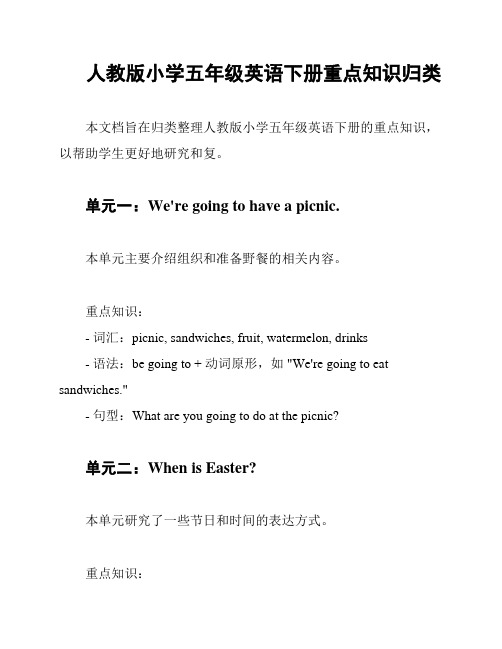
人教版小学五年级英语下册重点知识归类本文档旨在归类整理人教版小学五年级英语下册的重点知识,以帮助学生更好地研究和复。
单元一:We're going to have a picnic.本单元主要介绍组织和准备野餐的相关内容。
重点知识:- 词汇:picnic, sandwiches, fruit, watermelon, drinks- 语法:be going to + 动词原形,如 "We're going to eat sandwiches."- 句型:What are you going to do at the picnic?单元二:When is Easter?本单元研究了一些节日和时间的表达方式。
重点知识:- 词汇:Easter, Christmas, New Year's Day, Halloween- 语法:疑问词when和具体时间的表达,如 "When is Easter?"- 句型:When is Christmas?单元三:Do you want to go to a movie?本单元研究了表达意愿和邀请的相关内容。
重点知识:- 词汇:movie, park, zoo, museum, swimming pool- 语法:do you want to + 动词原形,如 "Do you want to go to a movie?"- 句型:Do you want to go to the park?单元四:Can you swim?本单元介绍了一些体育运动和能力的表达方式。
重点知识:- 词汇:swim, run, jump, skate, ride- 语法:can + 动词原形,如 "Can you swim?"- 句型:Can you ride a bike?单元五:What's the matter with you?本单元主要研究了描述身体状况和感受的表达方式。
PEP小学英语五年级下册第三单元知识点汇总

PEP小学英语五年级下册第三单元知识点汇总1henisurbirthda?你的生日是何时?It’sin+月份在…月。
2henisurbirthda?你的生日是何时?It’sn+日期在…日。
3raiseurhand举起你的手同义句:Handsup4Upustand起立。
同义句:ustandupTuhurtes触摸你的脚趾头。
名词,脚趾头,单数形式:te6中国节日SpringFestival春节Lantern’sDa元宵节en’sDa妇女节(arhtheeighth)Tree-plantingDa植树节LabrDa劳动节(或aDa)hildren’sDa儿童节DragnBatFestival端午节ArDa建军节(Augustthefirst)Teahers’Da教师节(Septeberthetenth)NatinalDa国庆节(tberthefirst)Neear’sDa元旦(anuarthefirst)7外国常见节日hristasEve平安夜(Deeberthetent-furth)hristasDa圣诞节(Deeberthetent-fifth)Neear’sDa新年Valentine’sDa情人节(Februarthefurteenth)AprilFl’sDa愚人节(Aprilthefirst)ther’sDa母亲节(ther’sDaisthesendSundaina)Father’sDa父亲节IndependeneDa美国独立日(ulthefurth)Halleen万圣节前夕(tberthethirt-first)ThansgivingDa感恩节(InAeriaThansgivingDaisthethirdThursdainNveber)8Hanbirthdasarethereinanuar?一月份有多少生日?Therebe句型提问,也要用Thereis/are…birthdasin…来回答9IsurbirthdainFebruar,t?你的生日也在二月吗?一样疑问句,改成陈述句:urbirthdaisinFebruar,t0-hatareuding?你正在干什么?-Iaaingabirthdahartfrurfail我在为咱们的家庭做一张生日图。
人教版PEP小学英语五年级下册知识点汇总(最新)
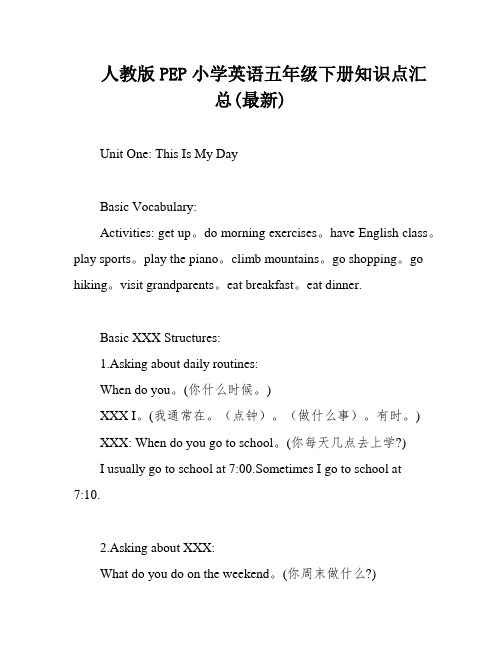
人教版PEP小学英语五年级下册知识点汇总(最新)Unit One: This Is My DayBasic Vocabulary:Activities: get up。
do morning exercises。
have English class。
play sports。
play the piano。
climb mountains。
go shopping。
go hiking。
visit grandparents。
eat breakfast。
eat dinner.Basic XXX Structures:1.Asking about daily routines:When do you。
(你什么时候。
)XXX I。
(我通常在。
(点钟)。
(做什么事)。
有时。
)XXX: When do you go to school。
(你每天几点去上学?)I usually go to school at 7:00.Sometimes I go to school at7:10.2.Asking about XXX:What do you do on the weekend。
(你周末做什么?)XXX I。
(我通常/经常。
有时。
)XXX: What do you do on the weekend?I often play XXX I go shopping with my mom.3.Introducing one's own habits:Every weekend。
I go hiking。
(我每个周末远足。
)Every day。
I do my homework at 8:00 in the evening。
(我每天晚上8点做作业。
)4.Asking XXX:What do you do。
(你是干什么的?)Time:morning。
afternoon。
evening。
noon。
at night。
6:00.on Sunday。
PEP小学五年级英语下册知识清单

PEP小学五年级英语下册Unit 1 My day 知识清单【句型/语法知识点】一. 频度副词(放主语之后)。
always总是(100%); usually通常(80%); often 经常(60%);sometimes有时(30%);never从不(0%)二. 重点句型。
1. 询问别人什么时候做某事的句型及回答。
句型结构:问:When +助动词do/does + 主语(非三单/三单)+ 动原+ 其他?答:①主语(非三单)+(频度副词)+动原+ at + 时间点.例:问:When do you go to bed?答:I go to bed at 9:00p.m答:②主语(三单)+(频度副词)+动词三单形式(动词s/es)+ at + 时间点.例:问:When does Amy go to bed?答:She goes to bed at 9:00 p.m.2. 询问别人周末做什么的句型及回答。
句型结构:问:What +助动词do/does + 主语(非三单/三单)+ do + on the weekend?答:①主语(非三单)+(频度副词)+动原.例:问:What do you do on the weekend?答:I usually read books.答:②主语(三单)+(频度副词)+动词三单形式(即动词s/es).例:问:What does Amy do on the weekend?答:She often goes shopping with her mother .三.句型转换:1.肯定句↔一般疑问句:I usually get up at 6:00. ↔ Do you usually get up at 6:00?肯定回答:Yes, I do. 否定回答:No, I don’t.(第三人称时) He eats dinner at 6:00p.m. ↔ Does he eat dinner at 6:00p.m.?肯定回答:Yes, he does. 否定回答:No, he doesn’t.2.肯定句↔否定句:I like playing the piano. ↔ I don’t like playin g the piano.I can play the piano. ↔ I can’t play the piano.3.划线提问:⑴ I often go shopping on the weekend. → When do you go shopping ?⑵ I often go shopping on the weekend. → What do you do on the weekend?⑶ I go to school at 7:00. → When do you go to school?四. 语音:cl /kl/ clean clock class clever pl /pl / plate eggplant please playPEP小学五年级英语下册Unit 2 My favourite season 知识清单【四会单词】【重点句型】【句型/语法知识点】一. 重点句型1. 询问别人天气怎么样的句型及回答。
5年级下册英语的重点
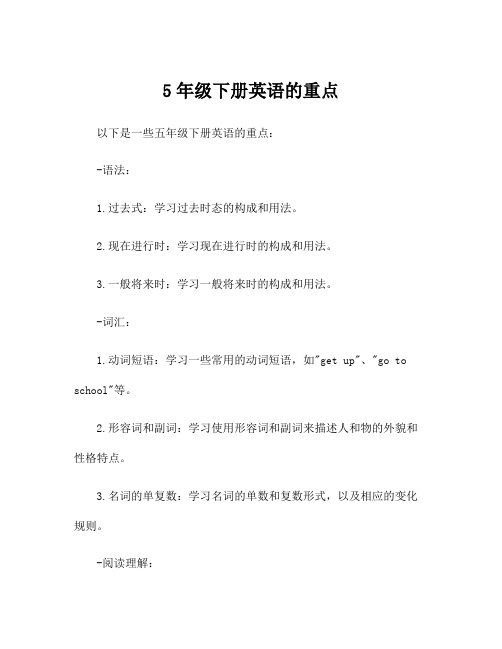
5年级下册英语的重点
以下是一些五年级下册英语的重点:
-语法:
1.过去式:学习过去时态的构成和用法。
2.现在进行时:学习现在进行时的构成和用法。
3.一般将来时:学习一般将来时的构成和用法。
-词汇:
1.动词短语:学习一些常用的动词短语,如"get up"、"go to school"等。
2.形容词和副词:学习使用形容词和副词来描述人和物的外貌和性格特点。
3.名词的单复数:学习名词的单数和复数形式,以及相应的变化规则。
-阅读理解:
1.短文理解:学习如何根据短文内容回答问题。
2.推理判断:学习通过对短文中信息的推理和判断,进行问题回答。
-口语表达:
1.日常交际用语:学习一些日常生活中常用的交际用语,如问候、请求、道谢等。
2.对话练习:通过对话练习,培养听说能力。
3.情景对话:学习在特定情境下进行对话交流。
-写作技巧:
1.句子结构:学习如何组织和连接句子,使文章流畅。
2.简单的写作练习:学习如何描述人、物、事件等,以及如何按
照时间顺序组织自己的写作。
这些只是五年级下册英语的一部分重点,具体的重点内容可能会
因不同教材和学校的教学要求而有所不同。
建议您根据教材和老师的
指导,仔细学习相关内容。
五年级下册英语期末复习(单词拼写)∣人教(PEP)(含答案)
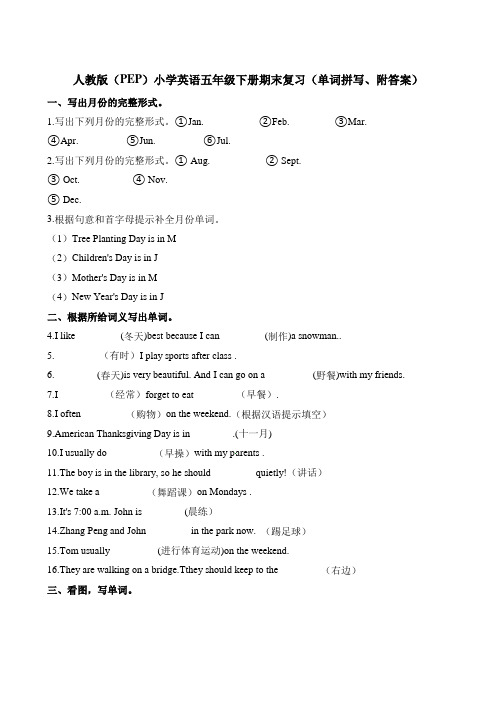
人教版(PEP)小学英语五年级下册期末复习(单词拼写、附答案)一、写出月份的完整形式。
1.写出下列月份的完整形式。
①Jan.________ ②Feb.________ ③Mar.________④Apr.________ ⑤Jun.________ ⑥Jul. ________2.写出下列月份的完整形式。
① Aug. ________ ② Sept. ________③ Oct.________ ④ Nov. ________⑤ Dec.________3.根据句意和首字母提示补全月份单词。
(1)Tree Planting Day is in M________(2)Children's Day is in J________(3)Mother's Day is in M________(4)New Year's Day is in J________二、根据所给词义写出单词。
4.I like ________ (冬天)best because I can ________ (制作)a snowman..5.________ (有时)I play sports after class .6.________ (春天)is very beautiful. And I can go on a ________ (野餐)with my friends.7.I ________ (经常)forget to eat ________(早餐).8.I often ________ (购物)on the weekend.(根据汉语提示填空)9.American Thanksgiving Day is in ________.(十一月)10.I usually do ________ (早操)with my parents .11.The boy is in the library, so he should ________ quietly!(讲话)12.We take a ________ (舞蹈课)on Mondays .13.It's 7:00 a.m. John is ________(晨练)14.Zhang Peng and John ________ in the park now. (踢足球)15.Tom usually________ (进行体育运动)on the weekend.16.They are walking on a bridge.Tthey should keep to the ________(右边)三、看图,写单词。
PEP小学英语五年级下册各单元要点总结
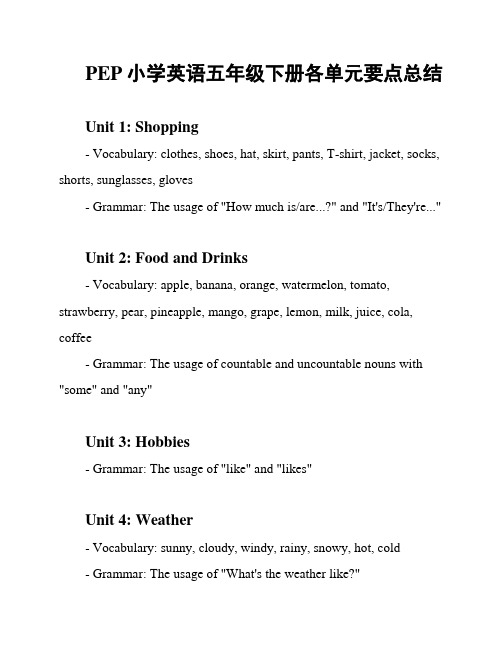
PEP小学英语五年级下册各单元要点总结Unit 1: Shopping- Vocabulary: clothes, shoes, hat, skirt, pants, T-shirt, jacket, socks, shorts, sunglasses, gloves- Grammar: The usage of "How much is/are...?" and "It's/They're..."Unit 2: Food and Drinks- Vocabulary: apple, banana, orange, watermelon, tomato, strawberry, pear, pineapple, mango, grape, lemon, milk, juice, cola, coffee- Grammar: The usage of countable and uncountable nouns with "some" and "any"Unit 3: Hobbies- Grammar: The usage of "like" and "likes"Unit 4: Weather- Vocabulary: sunny, cloudy, windy, rainy, snowy, hot, cold- Grammar: The usage of "What's the weather like?"Unit 5: Classroom- Vocabulary: desk, chair, blackboard, eraser, pencil, ruler, book, pen, bag, sharpener, glue, scissors- Grammar: The usage of prepositions "on", "in", and "under"Unit 6: Daily Routines- Vocabulary: get up, have breakfast, brush teeth, go to school, have lunch, do homework, have dinner, take a bath, go to bed- Grammar: The usage of present simple tense with daily routinesUnit 7: Jobs- Vocabulary: doctor, teacher, driver, police officer, firefighter, chef, engineer, artist, musician, journalist, scientist, astronaut- Grammar: The construction "What does he/she do?" and the usage of adjectives to describe jobsUnit 8: Animals- Vocabulary: dog, cat, bird, fish, rabbit, monkey, tiger, lion, elephant, panda, giraffe, snake, kangaroo- Grammar: The usage of "Can" to talk about abilitiesUnit 9: Festivals- Vocabulary: Spring Festival, Christmas, Thanksgiving, Easter, Halloween, Lantern Festival, Dragon Boat Festival, Mid-Autumn Festival, National Day- Grammar: The usage of "When is...?" and the construction "I like... because..."Unit 10: My City- Vocabulary: park, supermarket, hospital, school, post office, bank, library, restaurant, cinema, zoo, museum, airport, train station, subway - Grammar: The usage of prepositions "near", "next to", and "between"以上是PEP小学英语五年级下册各单元的要点总结。
- 1、下载文档前请自行甄别文档内容的完整性,平台不提供额外的编辑、内容补充、找答案等附加服务。
- 2、"仅部分预览"的文档,不可在线预览部分如存在完整性等问题,可反馈申请退款(可完整预览的文档不适用该条件!)。
- 3、如文档侵犯您的权益,请联系客服反馈,我们会尽快为您处理(人工客服工作时间:9:00-18:30)。
PEP五年级下册英语期末总复习Unit 1 This Is My Daydo morning exercises晨练 eat breakfast吃早饭 have English class上英语课play sports进行体育运动 eat dinner吃晚饭 when什么时候evening夜晚;晚上 get up起床 go hiking去远足usually通常;一般 noon中午 climb mountains爬山go shopping 购物买东西 play the piano弹钢琴 visit grandparents看望祖父母weekend周末 often经常 sometimes有时候话题:日常生活时态:一般现在时1.When do you do morning exercises? 你什么时候做早操?I usually do morning exercises at 8:00. 我经常八点钟做早操。
(I usually get up at 12:00 at noon . 我经常在中午十二点起床。
)2.When do you eat dinner ? 你什么时候吃晚餐?I eat dinner at 7:00 in the evening. 我在晚上七点种吃晚餐。
3.When is the best time to go to Beijing? Fall. 最好在什么时候去北京?秋天。
语法考点:1.When引导的特殊疑问句,就作息时间进行问答:--- When do you + 行为活动?--- I + 行为活动 + 具体时间。
例:A: When do you eat dinner? B: I eat dinner at 7: 00.2.What引导的特殊疑问句,就活动内容进行问答:--- What do you do + 时间?(教材主要是周末)--- I + sometimes / often / usually + 行为活动 + 时间。
例:A: What do you do on the weekend? B: I often play football.Unit 2 My Favourite Seasonspring春天 summer夏天 fall秋天 winter冬天 season季节which哪一个 best最;极 swim游泳 fly kites放风筝 plant trees种树skate滑冰 why为什么 because因为 sleep睡觉 make a snowman堆雪人话题:季节时态:一般现在时1.Which season do you like best ? I like spring best.(Spring.)你最喜欢是什么季节?我最喜欢春季。
2.What is your favourite season? My favourite seson is spring.(Spring.) 你最喜爱的季节是什么季节?我最喜爱的季节是春季。
3.Why do you like summer? Because I can…….(Because it’s warm ,windy and sunny.) 你为什么喜欢夏天?因为我可以……(因为天气是……)4.I like summer, because I can swim in the lake.我喜欢夏天。
因为我可以在湖里游泳。
5.Spring is good ,but fall is my favourite season.春天是好的。
但秋天是我最喜欢的季节。
6.What’s the weather like in fall in Beijing? It’s sunny and cool.秋天的北京是什么天气?是晴朗和凉爽的。
7.What season is it in March in Beijing? It’s spring.在北京的三月份是什么季节?是春天。
语法考点:1.Which 引导的特殊疑问句,谈论最喜欢的季节:--- Which season do you like best? / What's your favourite season?--- I like + 季节 + best.2.Why 引导的特殊疑问句,谈论喜欢某个季节的原因:--- Why do you like + 季节?--- Because I can + 行为活动。
Unit 3 My BirthdayJan./January一月 Feb./February二月 Mar./March三月 Apr./April四月May五月 June六月 July七月 Aug./Augest八月Sept./September九月 Oct./October十月 Nov./November十一月Dec./December十二月 birthday生日 date日期话题:生日节日时态:一般现在时1.When is Teacher’s Day ? 什么时候是教师节?New Year’s Day (Jan. 1st) 新年 W omen’s Day ( Mar. 8th) 妇女节Tree Planting Day ( Mar. 12th) 植树节Children’s Day( June 1st ) 儿童节Army Day ( Aug. 1st ) 建军节 Teacher’s Day(sept. 10th) 教师节Christmas Day ( Dec. 25th) 圣诞节 National Day ( Oct. 1st) 国庆节2.Who has a birthday is in July ? Mike’s birt hday is in July.谁的生日在七月?Mike的生日在七月。
3.Is her birthday in June? Yes, it is ./No, it isn’t .她的生日在六月吗?是的/不是的。
4.When is your birthday? My birthday is in May.What’s the date? It’s May 10th.你的生日是什么时候?我的生日在五月。
几号?五月十日。
5.What is the date today? It’s June 3rd.今天是几月几号?今天是六月3号。
语法考点:1.When引导的特殊疑问句,就什么时候过生日进行问答:--- When is + 某人的(你的,我的,他、她的)+ birthday? --- It's in +月份。
2.Is引导的一般疑问句,就某人的生日是否在某个时间进行提问:--- Is + 某人的 + in + 月份?--- Yes, it is. / No, it isn't.3.What引导的特殊疑问句,就节日(包括生日)的具体日期进行问答:--- What's the date? --- It's + 几月几号(具体日期)。
Unit 4 What Are You Doing?draw pictures画画 cook dinner做饭 read a book看书answer the phone接电话 listen to music听音乐 clean the room打扫房间write a letter写信 write an e-mail写电子邮件 study书房话题:日常生活时态:现在进行时 ( be doing now )1.What is ZhangPeng doing ? 张鹏正在做什么?He is answering the phone. 他正在听电话。
Grandpa is writing a letter. 外祖父正在写信。
Brother is doing homework . 哥哥(弟弟)正在做作业。
Mom is cooking dinner in the kichen. 妈妈正在厨房里做饭。
Father is writing an e-mail. 爸爸正在写电子邮件。
2.Hello, this is Zhang Peng. 你好,这里是张鹏。
Can I speak to Chen Jie ,Please? 我可以跟陈洁通话吗?Sure. Please hold on. She’s listening to music. 可以。
请等一下。
她正在听音乐。
语法考点:正在进行时 be doing (now / look! / Listen!)1.What引导的特殊疑问句,直接提问对方正在干什么:--- What are you doing? --- I'm + 行为活动。
2.What引导的特殊疑问句,提问对方、某人正在干什么:--- What is + 某人 + doing? --- He / She / 某人 + is + 行为活动 (doing). 3. 电话用语:介绍自己:This is / It's + 自己的名字.要找某人:Can I speak to + 要找的人.请稍等:Please hold on.3.What are you doing? I am doing the dishes. 你正在做什么?我正在洗碗碟。
Unit 5 Look at the Monkeysfly飞 jump跳 walk走 run跑 swim游泳sleep睡觉 climb往上爬 fight打架 swing荡;荡秋千 drink water喝水话题:动物时态:现在进行时1.What do you see ? I see two kangaroos. 你看见什么?我看见两只袋鼠。
2.What can monkey do? It can swing. 猴子能干什么? 它会荡秋千。
3.What is the mother kangaroo doing? She’s jumping.母袋鼠正在做什么?她正在跳跃。
4.Look at the monkey. What is it doing ? It’s eating bananas.看那只猴子。
它正在做什么?它正在吃香蕉。
5.What are the tigers doing ? They are fighting. 老虎正在做什么?它们在打架。
6.Are you eating lunch ? 你们(你)正在吃午餐吗?Yes, we are/Yes, I am / No, we aren’t/ No, I am not .是的,我们是/是,我是/不,我们不是/不,我不是。
7.Are the ants eating honey ? 蚂蚁正在吃蜜糖吗?Yes, they are./No ,they aren’t .它们是/它们不是。
